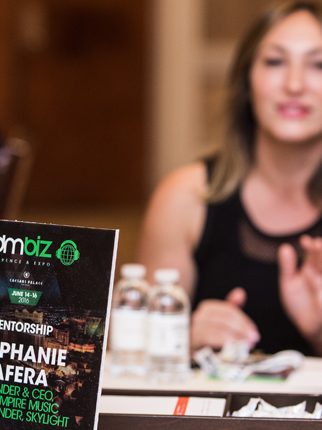Power Manager Stephanie LaFera Shares Her Secrets to Success
You may not know her name, but you know her artists. Whether it’s Galantis, CID, or some guy named Kaskade, Stephanie LaFera has been guiding their careers and pushing them to greatness via her management company, Little Empire Music. But LaFera hasn’t been content with her own success; she wants to pass it on. That’s why in 2013, she cofounded Skylight, a mentorship program for young women in the dance music industry. And earlier this year, she partnered with Insomniac to offer focused mentorship sessions at EDMbiz. We caught up with LaFera to get to know how she became the powerhouse manager she is today and unlock some of her secrets to success.
You have been working in dance music for a long time. When did you finally feel like, “OK, I’ve made it”?
Stephanie LaFera: It’s a tough question, because “making it” was never really a priority for me. Sure, I wanted to succeed in whatever I did, but it was really more about being a part of the community and working alongside artists to achieve their dreams. If “making it” means the artists that we work with are able to prosper by creating the music they want, and people are listening to it, then I guess I made it!

Is there something in your career—or the careers of your artists—that you’re most proud of?
I’ve always emphasized that Little Empire would set out to work with career-minded artists that are interested in longevity, and I’m proud that we’ve been able to hold true to that philosophy. It’s now been something like 13 years that we’ve been working with Kaskade, and I still get chills when I think of some of the historic events we’ve helped bring to life, and how many more we still have to come.
Developing a newer act like Galantis has also been such a thrill, which I’m definitely proud to be a part of. Going from their first show ever at Coachella in 2014, to now being something like the 17th most listened-to artist worldwide on Spotify, has been quite a ride. I’m really proud of our amazing roster and the amazing team that we have at LEM. You’re really only as good as the people around you.

On the flip side, is there an instance when you failed and that you learned something from?
I fail all the time; the key is to learn from your mistakes. One failure that comes to mind is not biting the bullet and hiring a larger staff earlier. It’s a failure that comes from the learning curve of running a company. Learning to delegate is key; put your ego aside to not feel like you’re the one who has to do everything. You have to find people you trust and empower them.
Anyone who has found success knows what it means to have had good mentors. Who were some of your best mentors? What were some of the key elements of good mentorship that you want to pass along?
There are so many people that have positively impacted my career, that it’d be impossible to start listing them all, but I’ll name one: I was lucky enough through one of my first jobs to meet Joe Serling, who later became my lawyer. He’s actually watched me grow up in this business and has been both a great friend and amazing business asset. As a mentor, Joe never sugarcoats anything and always gives real-world advice, and that’s something I tried to replicate in the EDMbiz program.

What about this moment in your career motivated you to pursue this program?
I’ve always felt strongly about mentoring, and it’s something I’ve tried to incorporate into both the culture at Little Empire and my nonprofit Skylight, which I started with Kerri Mason in 2013.
We launched a much smaller mentor program at the inaugural EDMbiz a few years ago, and while it was really rewarding for those involved, I felt like it didn’t reach enough people.
The longer I work in this business, the more I understand the impact that a few words of wisdom—from someone that’s been through it before—can have on a person.
How did you choose the participants in this program? Are there key qualities you look for?
All of the mentors were selected because they are at the top of their respective games, they’re excellent communicators, and they’ve all expressed a deep interest in passing along what they’ve learned.
I try to put myself in the mentees’ shoes. If I were just getting my start in the business, I would definitely want to pick the brains of all of the mentors we selected.
Everybody who wants to work in music always wants to know: “How do you break into the industry?” How do you answer that question? Is there a trick that goes beyond the familiar tips of hard work and dedication?
I’d love to reveal a shortcut that leads to success, but I’ve never found one. Sometimes, you just have to show up. If you want to work for a promoter, go volunteer your time when you get off from your day job. If you want to work for a management office, go intern.
Long before landing my first job in management, I started as a temp, then a second assistant in the finance department of a giant music company, very far from the side of the music industry where I saw myself. But all the while I was doing promo work on the side, passing out flyers at raves, and trying to throw my own parties.
Do what you love, and work your ass off doing it.
Follow Stephanie LaFera on Facebook | Twitter



